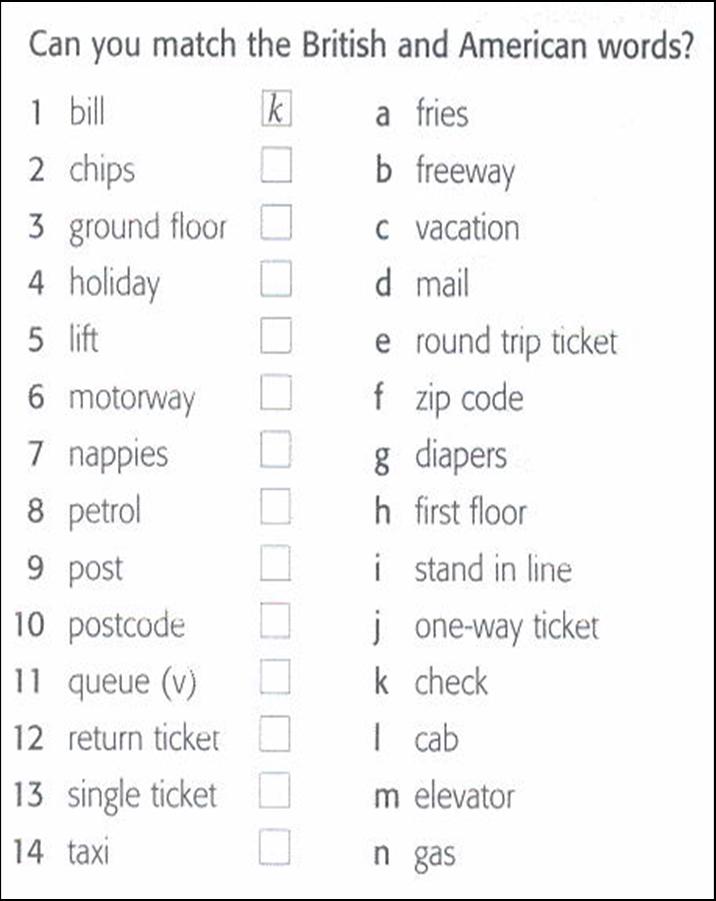 Although most schools in Europe only teach British English, many language learners have difficulties
Although most schools in Europe only teach British English, many language learners have difficulties distinguishing American English from British. Besides the differences in spelling, pronunciation and stress there are major vocabulary dissimilarities. There are different words for the same concepts. This is a short overview of the biggest differences between these two languages.
A complete article of the differences between British and American English can be found here.
Why these differences?
In the early 17th century the English language was introduced to Americans through the British colonization. Due to the strength of the British Empire, the language spread rapidly throughout the world. Spoken in so many countries, various dialects and spelling differences of the English language developed. Most American accents remained rhotic ( the R is pronounced as in hard) whereas in southern England the prestige non-rhotic accent was standardized. However, there are fascinating exceptions: New York and New England became non-rhotic; and Irish and Scottish accents remained rhotic.
Differences in use of tenses
In British English the present perfect is used to express an action that has occurred in the recent past and has an effect on the present moment. For example: I've misplaced my pen. Can you help me find it? In American English, the use of the past tense is also acceptable: I misplaced my pen. Can you help me find it? In British English, however, using the past tense in this example would considered to be incorrect.
Prepositions
There are also a few differences in preposition use including the following:
- American English - on the weekend
British English - at the weekend
- American English - on a team
British English - in a team
- American English - please write me soon
British English - please write to me soon
Vocab differences

Time telling
Both languages have a slightly different structure of telling the time. While the British would say quarter past ten to 10:15, it is common in America to say quarter after or even a quarter after ten.Thirty minutes after the hour is called half past in both languages. Americans always write digital times with a colon, such as 6:00, whereas Britons often use a point, 6.00.

Probably the funniest way to explore the differences between British and American English is by taking a look at their slang words:
Imagine inviting a British friend to your American apartment. After being there for a while, she might get hungry and ask for the larder. No? What about cupboard? Eventually you realize, she ment pantry. Later, you schedule a date for the next visit and she writes it down in her diary while you mark it in your calender. When she calls you on the phone she rings you up but if the line was busy, she would say the line was engaged. Why is the line getting married?
The other day she told you a story about a pissed woman. Why is the woman so angry, you wondered? Actually, what she ment was that the woman was extremely drunk.
Imagine a young British couple, which just got married, hosting a dinner for their parents. They have put in a great amount of effort to prepare their home and the meal to impress. The bride’s father says: “Well, let me have a butchers at your spotted dick.” This family knows that have a butchers means to have a look, and that the spotted dick is a dessert made of pudding and dried fruit. The Americans, however, might be wondering what STD the groom has and why on earth would he be letting his father-in-law have a butchers at him, whatever that means! In any case, using the word butcher in a sentence with the slang word for a certain male body part, most American men cross their legs simultaneously.
Imagine a young American couple close to their wedding date. The bride-to-be might say to her fiance: “Honey, our wedding is only two months away - I think we need to take some shagging lessons.” Shagging is a popular swing dance in the US. The British, however, would think it is quite humourous that this woman is suggesting lessons in sexual intercourse. That is the British meaning for the slang word shagging. My husband really gets a kick out of the Shagging Contests that are announced over the radio here.
Other words:
Before I go on stage I often get the collywobbles.
He is so minted. Look at his car!
Don't talk tosh.
Your friend is a real wazzock, I'm sorry to say that.
Did you see Jennifer Lawrence fall arse over tit at the Oscars?
Don't drink plonk when you plan to rumpy pumpy later.
Everytime when you are legless you're miffed, gobby and the night ends balls-up.
Look up the words, you didn't understand from above.
Only know the American word and want to find the British equivalent?
This might help here
Fabulous glossary of many British words can be found here.
further reading:
http://www15.uta.fi/FAST/US1/REF/usgbintr.html
http://www.buzzfeed.com/mackenziekruvant/british-slang-americans-should-start-using
glossary (1)
glossary (2)
wikipedia glossary
No comments:
Post a Comment